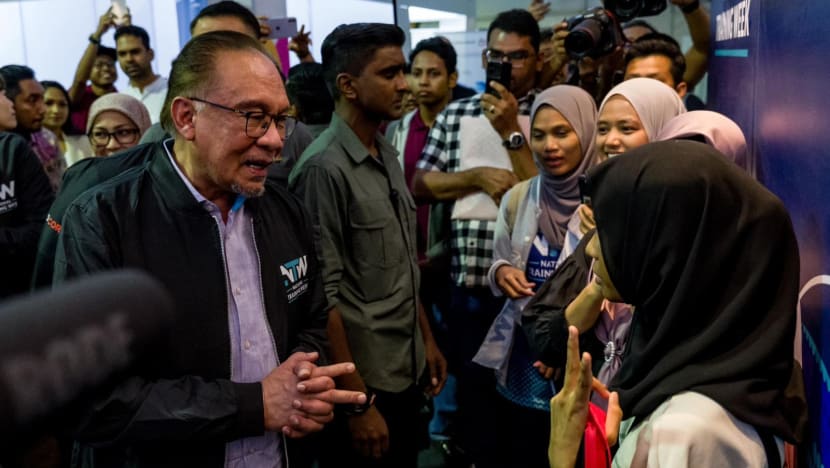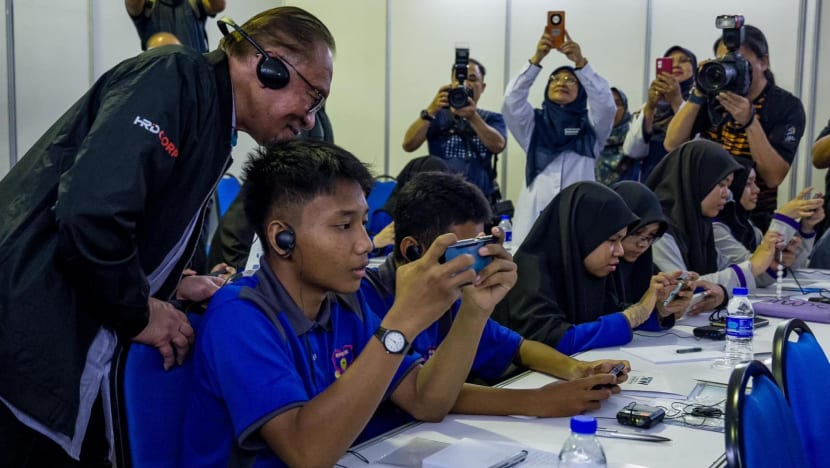Malaysia promises pre-university programme access for top scorers of all races but social inequalities remain, say experts
Malaysia is guaranteeing spots in a major pre-university programme for top scorers, regardless of race. While lauded as a “brave” move by Prime Minister Anwar Ibrahim, it does not address social inequalities, observers say.

Malaysia Prime Minister Anwar Ibrahim at the National Training Week 2024. (Photo: Facebook/ Anwar Ibrahim)

This audio is generated by an AI tool.
SINGAPORE: Malaysia’s assurance it will admit top scorers regardless of race to a major pre-university programme is a bold move, but it does not address class-based inequalities, existing quotas and may now pose a double disadvantage to some non-Malays, experts say.
From this year, all students who score 10 As and above in the national Sijil Pelajaran Malaysia (SPM) exam typically taken by Secondary Five students will be guaranteed a place at matriculation level – typically a one year pre-university preparatory course offered by the Ministry of Education – Prime Minister Anwar Ibrahim announced this week.
Matriculation programmes are seen as the most accessible and affordable way to get into universities in the country.
Guaranteeing spots to top scorers recognises excellence regardless of race or background, Mr Anwar said.
But the programmes’ 90 per cent quota for bumiputeras – who include Malays and indigenous groups like the Orang Asli – and 10 per cent for non-bumiputeras will remain, he said.
This has raised questions on whether the quota for non-bumiputera students would be able to accommodate all top scorers from minority groups, but Higher Education Minister Zambry Abdul Kadir assured that the government would secure places for them, whether on a matriculation programme, or on another higher education route.
Top scorers who fail to get a spot in matriculation programmes may enter foundation programmes at public universities, he said. Those who do not get offered a place in either matriculation or foundation programmes may submit an appeal.
“BRAVE” MOVE, BUT DOESN’T ADDRESS PRIVILEGE AND DISADVANTAGE
Mr Anwar’s announcement can be considered a “brave change” with some political calculation involved, said professor of architecture at UCSI University, Mohd Tajuddin Mohd Rasdi.
The move towards greater meritocracy has “always” been on Mr Anwar’s agenda for change, said Prof Tajuddin, but the premier has had to take gradual steps – leaving the bumiputera quota in matriculation programmes unchanged, for example – to accommodate various factions he has to work with.

Mr Anwar could also have timed his announcement with the upcoming Sungai Bakap by-election in Penang in mind, said Prof Tajuddin.
The by-election on Jul 6 will see a fight between candidates from Pakatan Harapan – which is part of Mr Anwar’s unity government – and the opposition Perikatan Nasional (PN), and Prof Tajuddin noted that non-Malay votes will be a deciding factor.
Mr Anwar’s measure does not address issues of privilege and disadvantage, said Dr Lee Hwok Aun, senior fellow and co-coordinator of the Malaysia Studies Programme at ISEAS-Yusof Ishak Institute in Singapore.
“All top scorers have assuredly worked hard, but some will also have benefited from advantages of family income, tuition classes, better schools and learning environments,” he said.
“Others may work as hard but not enjoy the same privileges – and may not get straight As. Are they not deserving? There is no consideration of broader socio-economic factors.”
Non-bumiputera students who do not ace the SPM and do not get into a matriculation programme could also face a “double disadvantage of a tougher pathway to university”, said Dr Lee.
They have to take another pre-university exam called the STPM or Malaysian Higher School Certificate, which is harder than matriculation, but their STPM grades will be assessed on par with the matriculation grades of others when they apply for university, he explained. The STPM is considered equivalent to the A Levels.
“Moving forward, Malaysia must strive for a balance of higher education opportunity based on academic achievement, need or socioeconomic disadvantage, and diversity,” said Dr Lee.
Mr Anwar has acknowledged that his decision “does not imply that we have solved the issue of fairness in education”, as reported by news agency Bernama.
“Much more needs to be done to ensure opportunities for children (especially) from the urban poor, rural or interior areas,” he said on Jun 30 at the closing of the 2024 National Training Week.
Prof Tajuddin’s personal view is that the bumiputera quota for matriculation programmes can be reduced to 60 per cent or 70 per cent.
In addition, a certain proportion of places for bumiputeras could be set aside for students from lower-income households, he said.
With more pathways opening up, youths could also consider alternatives to the SPM to get into university or snag the jobs they want, he said.
They could earn a diploma first, or pursue micro-credential courses offered by higher education institutions that add up to formal qualifications while they work. “You can make money and finance yourself, rather than depend on your parents,” he said.
















